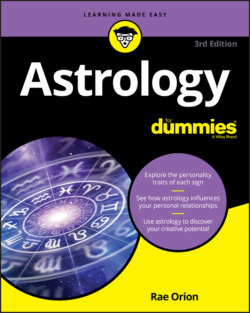Читать книгу Astrology For Dummies - Rae Orion - Страница 62
Greeting the dawn
ОглавлениеIn late April 1968, the rock musical Hair with its opening number, “Aquarius,” premiered on Broadway. Six months later, Linda Goodman’s Sun Signs was published, the first astrology book ever to hit the bestseller list. “What’s your sign?” became first a pick-up line, then a cliché, and finally the least cool thing a person could possibly say, even if it was what everyone wanted to know. In those days, there were astrological bookstores galore; classes in living rooms and coffee shops; discussion groups that convened in hipster movie theatres; paperback books with state-by-state listings of professional astrologers you could call on the phone, numbers included. If this wasn’t the dawning of the Age of Aquarius, what was?
Astrology reached a peak of visibility in 1988, when a former member of Ronald Reagan’s administration revealed that President Reagan and his wife, Nancy, regularly consulted an astrologer who timed their every move. The mockery was relentless. And it had an effect. Over the next decade, here and there, horoscope columns disappeared. Metaphysical bookstores closed their doors. If you weren’t looking, you might have thought that astrology was fading.
In fact, astrology was on the cusp of a fantastic blossoming, a Renaissance. The internet was part of it, as was the development of software that anyone could use. But the larger change wasn’t about the method of delivery or the ease of access. It was about expanding the worldview of astrology and reclaiming its history.
Astrologers began to examine traditions outside of western astrology such as Chinese, Meso-American, and Vedic astrology, the astrology of India. Also known as Jyotish, Vedic astrology has been particularly influential. It shares a chunk of its DNA with western astrology but veers off in other directions, using a sidereal zodiac based on the constellations rather than the ecliptic and relying on techniques unknown in western astrology.
Astrologers have also burrowed into the history of western astrology. In a decades-long effort spearheaded by astrologer Robert Hand, Project Hindsight, and the Archive for the Retrieval of Historical Astrological Texts or ARHAT (that being a Buddhist term for a person moving toward enlightenment), astrologers have translated ancient and medieval manuscripts and revived neglected techniques from centuries ago. Initially, this looked like an arcane interest shared by a tiny cadre of scholarly astrologers. But the excitement generated by their pursuit has rippled through the astrological community. Today, there is widespread interest in ancient techniques, particularly those of Hellenistic astrology, which was used through the Roman Empire and is currently undergoing an astonishing revival.
So astrology has changed. In the space of only a few decades, astrology has deepened and broadened, expanded its vocabulary, welcomed new celestial bodies into its cosmos, and incorporated ancient techniques of timing and analysis that most western astrologers knew nothing of — until recently. As unlikely as it seems, everything old is new again.
There are many excellent books about the history of astrology. Here are a few of my favorites:
A History of Western Astrology, Volumes I and II, by Nicholas Campion (Bloomsbury Academic, 2008). A magisterial, scholarly work.
The Secrets of the Vaulted Sky: Astrology and the Art of Prediction by David Berlinkski (Harcourt, Inc., 2003). Entertaining, evocative, and full of attitude.
Astrology: A History by Peter Whitfield (Harry N. Abrams, 2001). Nicely written and, unlike other books on the topic, profusely, gorgeously illustrated.
The Fated Sky: Astrology in History by Benson Bobrick (Simon & Schuster, 2005). Brilliant, fascinating, full of fantastic details. I recommend it without hesitation.
